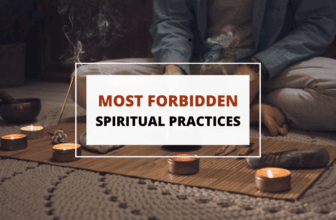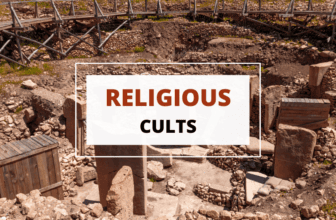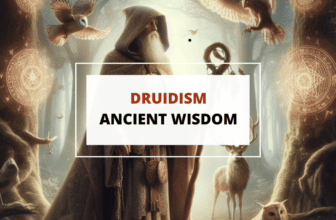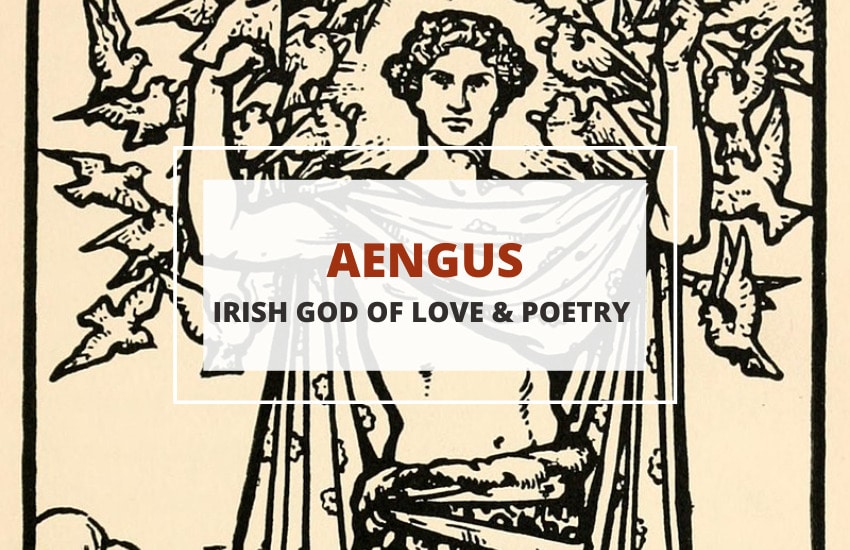
Table of Contents
Every ancient religion has a god of love. The Celtic god Aengus is that for the people of Ireland. He doesn’t shoot people with arrows of love but, instead, he has mastered the art of poetry. With his eternally youthful look and swift and clever tongue, the handsome Aengus is said to be able to woo every maiden in the land.
Indeed, Aengus’ escapades include much courtship. More than just a god of love, Aengus can also be seen as a god of mischief of sorts, as he is constantly getting into spats and arguments with his fellow Tuatha dé Danann. But thanks to his silver tongue, he always manages to get on top.
Who is Aengus?
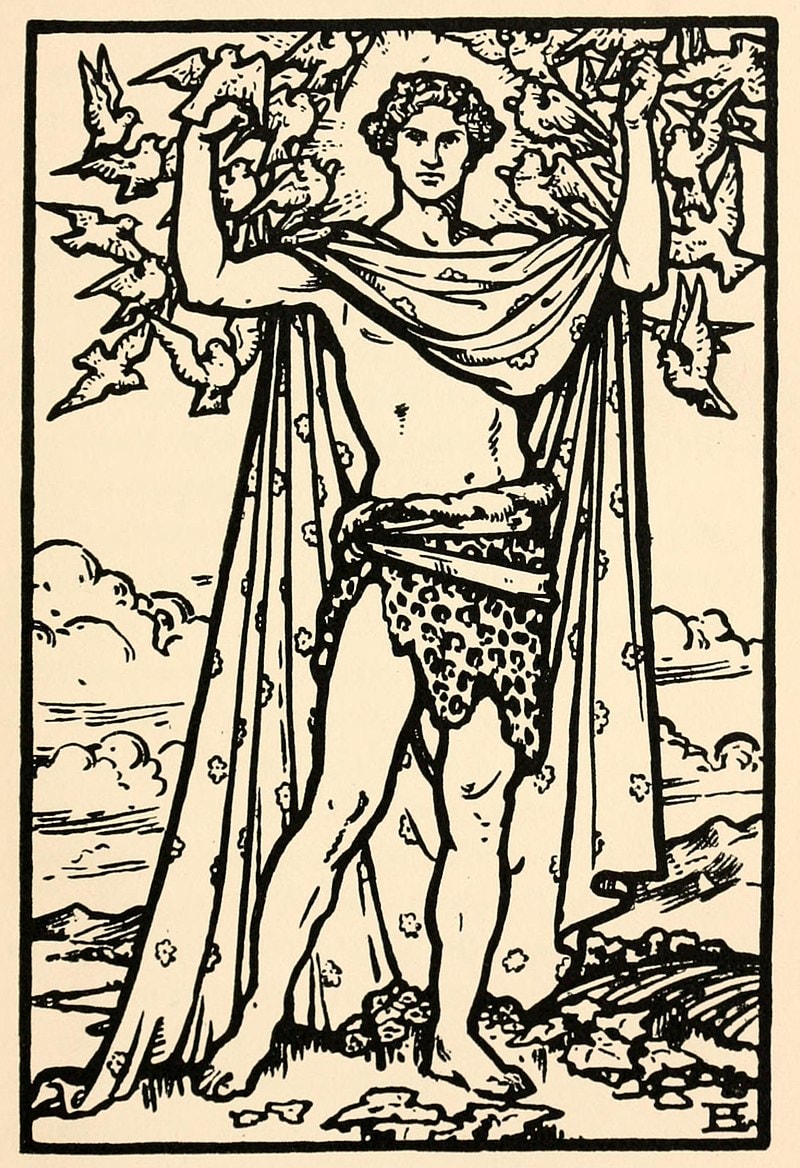
Aengus the Young, or Aengus Óg, is the chief bard of the Tuatha dé Danann tribe of Irish gods. His name translates from Proto-Celtic as One Strength (oino and gus). So, the full name of Aengus Óg can be understood as Youthful Strength or The Strength of Youth.
And, indeed, one of the signature qualities of the god Aengus is his neverending youth, courtesy of the unique circumstances of his birth. Thanks to that youthful handsomeness and his affinity for poetry and clever wordplay, Aengus has also become Ireland’s god of love. He is so charming that he’s even said to be constantly accompanied by four small birds that fly above his head. These birds are meant to represent his kisses and make him even more irresistible.
Yet, Aengus isn’t a god of love like some other religions’ deities. He doesn’t seek to inspire others into love or to help them fall into it unknowingly. Instead, he just personifies love and serves as a role model of just how poetic and charming young men can be.
Aengus’ Fantastical Powers
As he is a god, we shouldn’t be surprised at just how many magical tricks Aengus has up his sleeve. For one, he is immortal and eternally young, which is quite rare in the pantheon as many Celtic gods can grow old and die of advanced age.
Like other gods of love and youthfulness across the world’s pantheons, Aengus is also capable of not just healing but outright raising the dead. He has inherited the powers of resurrection from his father, the Daghda. It’s also from him that Aengus has got the ability to shapeshift into whatever creature he chooses.
Despite being a god of poetry and love, Aengus doesn’t walk around unarmed – he’s one of the Tuatha dé Danann gods, after all. Instead, he is always armed with four weapons. Two of them are swords – the Moralltach (Great Fury), a gift from the god of the sea Manannan mac Lir, and Beagalltach (Little Fury). His two spears are named Gáe Derg and Gáe Buide.
Myths Involving Aengus
Born In A Day
At the time of his birth, Aengus’s father, the patriarch and fertility deity the Daghda, and his mother, the river goddess Boann weren’t actually married. Instead, Boann was married to god Elcmar and she had an affair with the Daghda behind Elcmar’s back.
Once the Daghda accidentally got Boann pregnant, the two had to find a way to hide the pregnancy from Elcmar or their affair would have been revealed. The plan was simple – the Daghda would reach up into the sky and grab the sun. He’d then keep it in place for nine months, effectively making Boann’s entire pregnancy last only a day. That way, Elcmar wouldn’t “have the time” to notice her swollen belly.
And so it happened – Boann went through the pregnancy “quickly” and gave birth to little Aengus. The couple then gave Aengus to the Daghda’s other son Midir as a ward. In doing so, the adulterous couple not only managed to avoid Elcmar’s wrath but also accidentally gifted Aengus with eternal youth due to the unique circumstances of his gestation and birth.
A New Home for Free

Raised by Midir and the Daghda, Aengus inherited many of his father’s qualities, including his quick wit. One story is especially indicative of that – the story of how the Daghda and Aengus effectively stole Elcmar’s home Brú na Bóinne.
According to the myth, the two simply visited Elcmar and asked him if they could stay “for a day and night” in his home. As per the rules of hospitality, Elcmar agreed and let them in. What he didn’t consider, however, was that in Old Irish, “a day and a night” can mean “every day and every night”. So, in letting them into his home, Elcmar had given the Daghda and Aengus permission to use Brú na Bóinne forever.
Dating Misfortune
Aengus may be irresistibly beautiful and charming, but he hasn’t really won every woman’s heart. There was one mortal woman of great beauty named Étaín that he couldn’t quite win over.
As the myth goes, both Aengus and Midir, who is Aengus’s foster father in some versions of the myth, competed for Étaín’s favor and attention. It was Midir who won Étaín’s hand, despite being a river god and not a god of poetry of love. Unfortunately for Midir, he was already married to Fúamnach, the goddess of envy and witchcraft.
You’d think that cheating on an envious witch goddess isn’t a good idea, but Midir didn’t think things through that thoroughly. So, when his wife found out that her husband had married a second time behind her back, she grew furious and separated the newlywed couple with her magic. Not only that, but Fúamnach also turned Étaín into a fly and sent a powerful gust of wind to blow her away.
Aengus, still very much infatuated with Étaín, found her and tried to heal her and nurse her back to health. However, still in her fly form, Étaín accidentally landed on the cup of the warrior Étar’s wife. Before Étaín could fly away, Étar’s wife accidently swallowed her with her drink and killed her.
Étar’s wife did become pregnant at the expense of Étaín’s life but that didn’t really console Aengus. Furious, the god of love went to Fúamnach and decapitated her in revenge for Étaín’s life.
The Girl of His Dreams
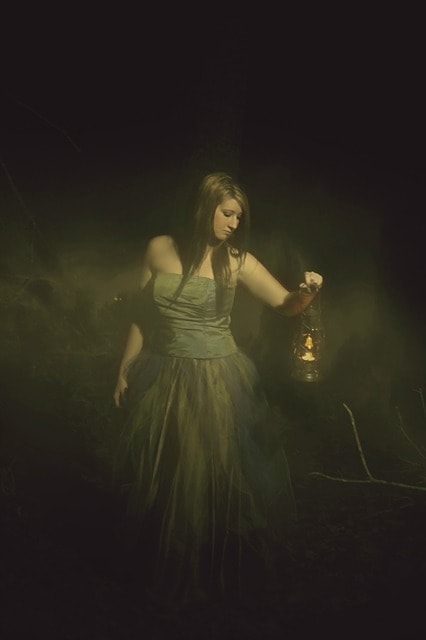
Probably the most famous myth about Aengus is that of how he met his future wife, the beautiful Caer Ibormeith. According to the Irish myth, a mysterious girl started appearing in Aengus’ dreams as he slept. The maiden was so beautiful that he immediately fell in love with her.
Finding a girl you’ve only dreamt of isn’t easy, so Aengus enlisted the help of his parents in his efforts to find the maiden. For an entire year Aengus and his parents looked for the girl but their efforts were in vain. The Daghda and Boann asked many other Tuatha dé Danann gods for help too and they continued the search for another year.
Eventually, one of the many who had joined the search made a breakthrough. King Bodb Derg of Munster located the maiden and even found out her name – Caer Ibormeith. The Daghda and Aengus had to negotiate extensively with the girl’s father Ethal Anbúail but he eventually told them where she was.
Caer Ibormeith was on the shores of a lake called The Dragon’s Mouth together with 149 other women, all bound in chains. At the end of the year at Samhain (October 31) all 150 maidens would turn into swans and spend the entire next year in that form before turning into women again.
Aengus immediately recognized the girl of his dreams and pleaded to be given the young maiden. He could only get the following deal, however – once she had transformed into a swan together with the rest of the women, Aengus could be allowed to guess which of the 150 swans was the girl of this dreams.
Aengus agreed and as soon as the maidens turned into swans, he too shapeshifted into a swan. In that form, he called out to Caer Ibormeith and she immediately went to him. Together, the two flew away to Aengus’ home.
Home Sweet Home
Returning home with Caer Ibormeith, Aengus received an unfortunate surprise – the Daghda was getting ready to pass away and had given away all his land to his children. For some reason, however, he had given none of it to Aengus.
Holding back his anger, Aengus decided to ask the Daghda a simple question – the same question the two of them had asked Elcmar years ago – could Aengus spend a day and a night at Brú na Bóinne? The Daghda agreed, not realizing the trick and effectively allowed Aengus to continue living in Brú na Bóinne for all of eternity together with Caer Ibormeith.
Symbolism of Aengus
Aengus’ symbolism is as beautiful as it is clear – he symbolizes the beauty of youth, poetry, and love. Thanks to his eternal life, he is always around, serving as an impossible standard for all young men who want to win a woman’s heart. Even though Aengus doesn’t get personally involved in others’ pursuit of love as some other gods of love, he serves as an inspiration of the beauty, youthfulness, and charm one must have to be worthy of love.
Importance of Aengus in Modern Culture
Celtic deities are not often represented in modern pop culture, but Aengus has made quite a few appearances in novels, comic books, and other works of fiction. Some prominent examples include William Butler Yeats’ The Song of Wandering Aengus where the god of love is the tragic protagonist, eternally searching for a lost love.
Kate Thompson’s The New Policeman novel is another good example as is Kevin Hearn’s Hounded – the first book of the Iron Druid Chronicles where Aegnus serves as a chief antagonist. He also makes an appearance in James Stephens’ The Crock of Gold and Hellboy: The Wild Hunt.
In Conclusion
Aengus is the handsome, eternally young, and quite well-spoken Celtic god of love and poetry. Clever, witty, and irresistibly charming, Aengus is the bard of the Tuatha dé Danann gods of Ireland. He lives happily married with his wife Caer Ibormeith in his late father’s estate of Brú na Bóinne and he serves as an undying inspiration for all young men looking for love.





